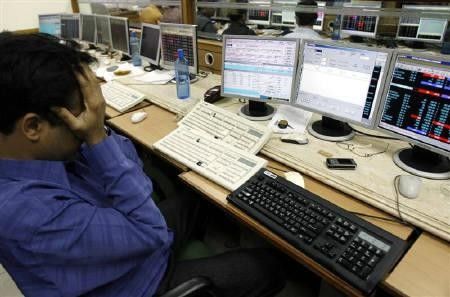 Following the National Democratic Alliance’s defeat in the Bihar Assembly election, the stock markets could on Monday open lower than their Friday close, something market participants call gap-down opening.
Following the National Democratic Alliance’s defeat in the Bihar Assembly election, the stock markets could on Monday open lower than their Friday close, something market participants call gap-down opening.
Experts believe the market will fall between one and three per cent on Monday.
This means a decline of 250-750 points for the BSE benchmark Sensex, which had closed at 26,265 on Friday.
To ring-fence the markets from any possible systemic issues and manipulations, the Securities and Exchange Board of India and the stock exchanges have beefed up their surveillance and risk-management systems.
They expect some volatility in the markets following the Bihar election results.
The manipulators typically tend to exploit such volatile situations in the stock market, so the regulator and the exchanges are extra vigilant this time, according to a senior official.
“The Securities and Exchange Board of India as well as the bourses and other market entities have prepared an elaborate vigil mechanism for tomorrow’s trading while the pre-market orders that might have been placed today or earlier will face extra scrutiny,” he added.
“It is not merely an Assembly election result; one might ignore it only at one’s peril. UP and Bihar contributed to a third of NDA’s win in the 2014 general elections. Now, with the Opposition consolidating, it seems the same result cannot be repeated in the 2019 general elections,” said Shankar Sharma, vice-chairman & managing director, First Global.
“It does not really augur well for markets, as development agenda is diluted with views of hardliners in BJP (Bharatiya Janata Party).”
According to Neelkanth Mishra, India equity strategist for Credit Suisse, NDA will now have to work harder to build a consensus for legislation, implying chances of meaningful reforms at the Centre gets reduced.
“The market was expecting an NDA defeat, but the large margin of loss means sentiment could get hit, particularly as these results are extrapolated into the future, just as the 2014 results were.”
Interestingly, four of the six exit polls that had come after the final phase of the Bihar polls had suggested a victory for the Nitish Kumar-led Grand Alliance; three were indicating a close victory.
So, to an extent, the markets were already factoring in the defeat.
The elections were seen as crucial for NDA, led by Prime Minister Narendra Modi’s BJP, which had won a massive victory in the 2014 general elections.
After that, it had done well in most state elections except Delhi, aided mainly by Modi’s popularity.
Also, state elections determine seat shares in the Rajya Sabha, where NDA does not have a majority to pass crucial Bills.
The Centre has seen delays in key legislation, including those on land acquisition and the goods and services tax, because of a lack of support in the Rajya Sabha. Bihar accounts for 16 Rajya Sabha seats.
“In terms of market sentiment, it will have some impact, as a whole cohort of investors put their money in India last year betting that Modi will turn the economy around.
"Because of the scale of the Bihar election verdict, some of those investors would have got shaken,” said Saurabh Mukherjea, chief executive (institutional equities), Ambit Capital.
According to a recent note by Kotak Institutional Equities, the politics of Bihar will feed into the coming Assembly elections -- in neighbouring West Bengal next year and Uttar Pradesh in 2017. “In the medium term, it can slowly -- though marginally -- impact the composition of the Rajya Sabha,” the note said.
Though there is the possibility of a near-term volatility, analysts believe the markets had to an extent discounted the possibility of NDA’s loss in the Bihar elections. Since the start of polling in Bihar on October 12, the National Stock Exchange’s Nifty had slipped about two per cent until November 6.
“Near-term impact on the economy or on earnings is insignificant, so the impact should be short-lived,” said Credit Suisse’s Mishra.
Sampath Reddy, chief investment officer, Bajaj Allianz Life Insurance, explained: “India has had an economic and stock market boom even under coalition governments.
This government at the Centre at present has a good majority.
So, there is no need for us to be worried.
Majority governments, both at the Centre and in states, are not a prerequisite for economic growth; it is not necessary for the central government to win all state elections to be able to deliver good performance. From that perspective, it isn’t a big setback.”
He, however, agreed that there were quite a few headwinds for the market in the near term.
Global events like the expected rate increase by the US Federal Reserve and an absence of domestic triggers will prove a drag on Indian equities, which are expected to trade weak.
Mukherjea said Ambit had been bearish on the Indian stock market since March, because the ability of India companies to drive earnings growth was non-existent.
“Our bearish view on Indian markets, thus, doesn’t change. Bihar isn’t central to it. If anything, the bigger issues to look out for would be the US Fed’s rate hike and events in China.”
The better-than-expected US jobs data over the weekend have only increased the probability of Fed raising the interest rate in December.
“The market will revert to fundamentals, and a meaningful direction will only be seen from January,” said Vikas Khemani, president & CEO, Edelweiss Securities.
On a positive note, Khemani added the loss would force the government to up the pace of reforms and development.

.jpg)








 © 2025
© 2025